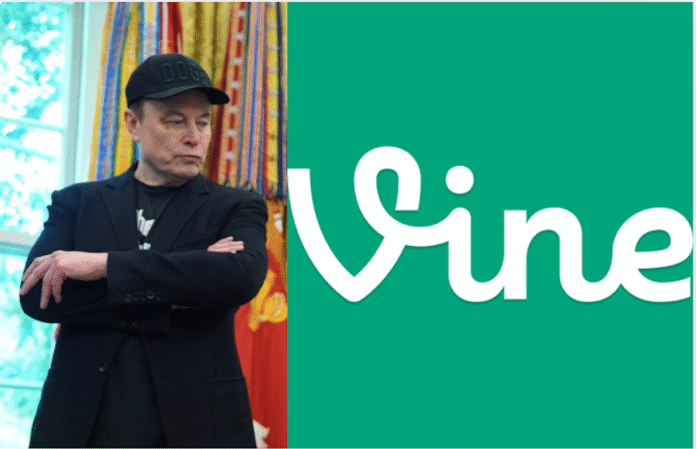- Elon Musk wants to bring back the iconic Vine app with a modern twist, powered by AI-generated short-form video content.
- Originally launched in 2012 and shut down in 2017, Vine helped launch major stars and was once home to over 200 million users. Now, Musk wants to bring it back.
- Public reaction is mixed, with excitement over the comeback that Musk wants to bring back and concern about AI replacing human creativity and influencers.
Elon Musk has once again sent shockwaves across social media, this time by announcing the potential revival of the short-form video app Vine. But in true Musk fashion, it won’t be a simple relaunch—it’ll come with a futuristic twist.
On Thursday, the Tesla and SpaceX boss shared on X (formerly Twitter) that he’s considering bringing Vine back, and this time, the videos might be entirely AI-generated. That’s right. The app known for its six-second bursts of creativity may return, but not as we once knew it.
The post came with very few details, just a teaser, but it quickly exploded online. Thousands chimed in, many thrilled at the idea of seeing Vine reborn. Some even went so far as to declare it the future of content.
“AI + short-form video = future of content,” one user wrote, summing up the excitement buzzing through the platform.
While some cheered Musk’s move, others raised concerns. What happens to human creativity? Will AI-generated influencers replace real people? And is this really about nostalgia—or something else entirely?
A Nostalgic Favorite Gets a High-Tech Spin
Vine first captured the internet’s attention in 2012 with its short, snappy videos. It was quirky, chaotic, and addictively fun. Millions of users across the globe—about 200 million at its peak—flocked to the platform. It helped launch the careers of now-household names like Shawn Mendes, Jake Paul, and Andrew King Bachelor, who all got their start looping six-second clips that somehow told full stories.
Twitter acquired Vine in 2013 under then-CEO Jack Dorsey. The purchase, reportedly worth around $30 million, seemed promising. Users could now easily share Vine content directly on Twitter. But behind the scenes, things weren’t so smooth.
Despite its popularity, Vine was bleeding. Creators complained about poor pay, the app lacked solid investment, and there was no clear strategy to grow or compete with rising video giants like YouTube. By January 2017, Vine was officially dead.
But Musk wants to bring back the beloved platform, appearing determined to dig it up—and rewire it.
The Billionaire’s Long Obsession with Vine
This isn’t the first time Musk has flirted with the idea of reviving Vine. Back in October 2022, shortly after acquiring Twitter for a whopping $40 billion, he posted a poll asking users if they wanted Vine back. An overwhelming 69% said yes.
Social media lit up with possibilities. MrBeast, the YouTube megastar, responded to Musk’s tweet with enthusiasm. “If you did that and actually competed with TikTok, that’d be hilarious,” he said.
But MrBeast also issued a warning: if Vine’s revival didn’t offer something radically different, it would be copied instantly.
“YouTube has Shorts, Instagram has Reels, Reddit, Snapchat, Facebook—all copied TikTok,” he noted. “Whatever you do will be on every other platform the next month unless it has a deep moat.”
In other words, if Vine 2.0 wants to survive, it can’t just ride on nostalgia. It needs to be a platform no one else can easily clone.
Musk seemed to take the challenge seriously. By 2023, he was tweeting again about bringing back a “better version” of Vine. Now, a year later, it looks like he’s inching closer to making it happen—only this time, with artificial intelligence as the engine.
Mixed Reactions: Excitement Meets Skepticism
While Musk’s announcement triggered waves of excitement, it also sparked some serious debate. Fans of the original Vine felt a mix of hope and hesitation. Could an AI-driven platform really recreate the spontaneous, often hilarious energy of the original app?
Others feared that turning Vine into an AI-content hub might strip it of its human touch altogether. After all, what made Vine unique wasn’t just the format—it was the personality and creativity of its users.
“It’s the human creativity that made Vine magical. AI can’t fake that,” one user posted.
Still, for tech enthusiasts and Musk supporters, this move feels bold and inevitable. As platforms like TikTok continue dominating global culture, the competition for the next generation of short-form content is heating up. Musk clearly wants in.
And he’s not one to back away from a fight.
Could Musk Really Beat TikTok?
Taking on TikTok is no small feat. The Chinese-owned app has become a cultural juggernaut, with more than a billion users worldwide. Its algorithm is frighteningly effective, its creators are wildly influential, and its short-form video model has been copied by nearly every social media platform.
But Musk is no stranger to uphill battles. He’s taken on the auto industry with Tesla, built rockets with SpaceX, and stirred up tech giants with his unpredictable, often controversial leadership of X.
If anyone can stir the pot and shift the narrative, it’s him. Musk wants to bring back a legacy and redefine it.
Still, critics warn that AI-generated content might not be the revolution Musk hopes it will be. There’s a real risk of flooding social media with synthetic content that feels impersonal and repetitive. And let’s not forget the ethical questions surrounding deepfakes, copyright, and authenticity.




